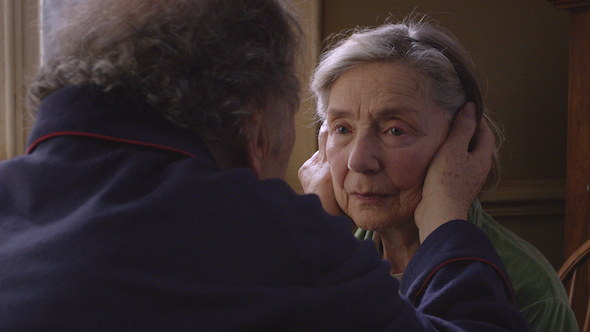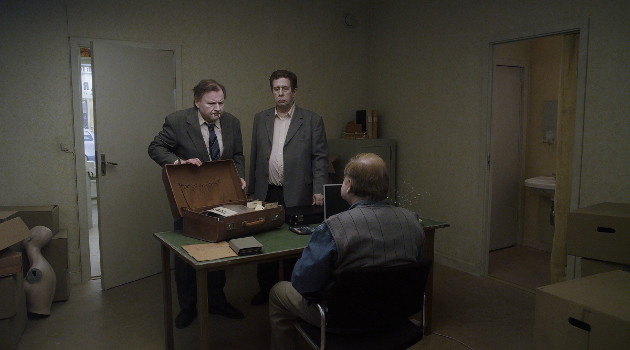Amour
Directed by Michael Haneke
Written by Michael Haneke
Starring Jean-Louis Trintignant, Emmanuelle Riva, Isabelle Huppert
Love is a many splendored thing, and never was the promise of ‘until death do us part’ more ruthlessly examined that in Amour, one of the most highly anticipated films of this years London Film Festival. Taking the prestigious Palme D’Or at Cannes Michael Haneke’s follow-up to his similarly award laden The White Ribbon is another powerful work, a chamber piece with a fantastically talented cast with strong candidates for the most desolate performances of the year. In present day Paris an elderly couple Georges (Trintignant) and Anne (Riva, who displayed a more youthful love in a different form fifty years ago in Rensais Hiroshima Mon Amour) attend a piano recital and retire back to their modest apartment. Both are retired music tutors who are quietly gentle, affectionate and caring of each other, proof of a long and fruitful marriage. The next day Anne has a disorientating incident, worrying Georges, and a doctors examination places her in hospital for emergency surgery. Afflicted by a stroke which paralyses half of her body Anne is discharged back to her home for a long and protracted death, the couples daughter (Huppert) clashing with her father on how best to care for her ailing mother.
Both Trintignant and Riva are incredibly adroit in this devastating mediation on life and loss, at the cusp of the eternal void which awaits us all. Shot with Haneke’s trademark Austrian austerity the film is pitched in long, distanced takes, incrementally building a portrait of an enduring bond between the couple which is tested to the limits of patience and empathy. The soft and scattered photography of Darius Khondji is confined to the couples apartment after the brief piano recital during the films opening movements, with the always formidable Huppert quietly destroyed by her mothers deteriorating condition. Haneke is unflinching with the brutal facts of a long, tortuous disintegration of mind and of the body, where even pity from colleagues and friends can be as painful as the illness itself, on the immense strains it compresses on those trying their best to ease the discomfort of their loved ones, in an impossible and inescapable scenario that can only end with loss and grief. �
The solitary setting makes this as an almost claustrophbic, suffocating experience, but also finally a transcedent one, as Haneke moves away from his usual lectures on the moral failings of society to a more intimate plateau, with his usual chilly and ascetic hand on the tiller to steer the film through to deep emotional waters, without a single, solitary trace of sentimentality. Amour is deeply moving and elegiac, a quiet masterpiece that will haunt you for weeks, with a final coda which is utterly obliterating.
John McEntee
The 56th BFI London Film Festival runs Oct. 10th – 21st. Please visit the festival’s official website for a complete schedule of films, screening times, and further information on Amour.






